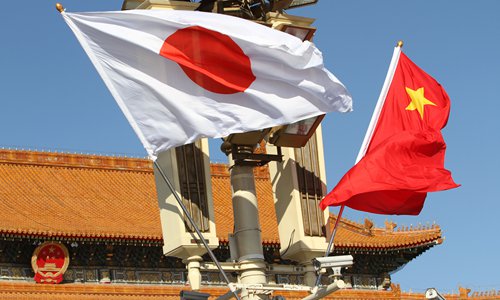HOME >> OPINION
China-Japan relations eye a new sunrise amid regional political flux
By Zhang Yong Source:Global Times Published: 2019/8/18 20:58:39

Photo: IC
A new round of China-Japan strategic dialogue, co-hosted by Chinese Vice Foreign Minister Le Yucheng and his Japanese counterpart Takeo Akiba, was held in the town of Karuizawa, north of Tokyo, on August 10. According to a brief statement issued later by China's Ministry of Foreign Affairs, the two sides confirmed that they would push forward the consensus reached ahead of the G20 summit in Japan in June between Chinese President Xi Jinping and Japanese Prime Minister Shinzo Abe and strive to build a relationship that would meet the requirements of a new era.
The China-Japan strategic dialogue resumed after a seven-year hiatus against the backdrop of continuously improving bilateral relations. The last round of the dialogue was held in June 2012 and then suspended due to some missteps by Japan.
Recent years have seen joint efforts to bring bilateral relations back on track. In the new situation, how to effectively implement the consensus reached between leaders of the two countries, promote communication and cooperation and enhance mutual trust are important to both China and Japan. This is the main reason for the resumption of the strategic dialogue. The topics of the dialogue include not only bilateral relations, but also important international and regional issues of common concern.
The world is undergoing profound changes unseen in a century and the international order is in a state of flux. China and Japan, as the second and third largest economies in the world, should seize the opportunities and try to resolve the risks caused by instability. This is a hard-won situation that should be cherished. The two should strengthen their cooperation to jointly deal with challenges.
If the momentum of high-level exchanges can be maintained, pragmatic cooperation between the two and in third-party markets can be steadily improved, a sound and stable bilateral relationship can be anticipated in the long run.
Meanwhile, Japan should constantly consolidate mutual political trust with China by properly handling issues related to history, the Taiwan question, and the territorial disputes, paving the way for creating a new era in bilateral relations.
More efforts to further cement the public's support for bilateral relations from the two sides are needed, to achieve which, innovative exchanges among young people and think tank dialogues should be carried out.
On the international and regional arena, China and Japan should act as defenders of multilateralism and the free trade system and promote regional stability and cooperation.
China and Japan belong to Northeast Asia, a region subject to various internal and external influences. The situation in the region is complicated and a slight move in one part may affect the situation as a whole. In his annual policy speech delivered in January, Abe vowed to settle Japan's postwar diplomacy conundrum. Now Japan and South Korea are locked in a row. Does playing tough symbolize Japan's new diplomatic model to solve historical problems? China hopes Japan and South Korea, as two responsible global powers, can properly handle conflicts and differences, better contributing to regional stability and cooperation.
At a time when China-Japan relations are back to normal, strategic dialogue has resumed. Bilateral relations can thus be consolidated and mutual strategic trust can be enhanced through candid exchanges. The resumed strategic dialogue is timely and has far-reaching implications. Opportunities and challenges lie ahead. It's the common responsibility of China and Japan to bring a bright prospect to the bilateral relationship through pragmatic communication and coordination.
The author is vice director of diplomatic studies at Institute of Japanese Studies, Chinese Academy of Social Sciences. opinion@globaltimes.com.cn
Posted in: ASIAN REVIEW